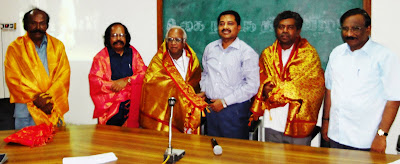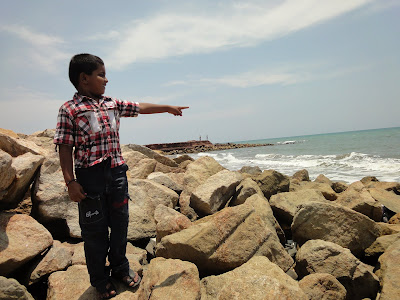 | ||
| Dr.K.Govindaraju with Prof.M.A.Windey |
‘Education is a powerful “equalizer”, opening doors to all to lift themselves out of poverty’ said Prof.M.A.Windey, noted Social reformer of international repute in his inaugural address of a seminar organized by SEVAI, a Trichy based NGO on 2nd March 2002 in SEVAI Centre. Prof.M.A.Windey further said that education empowers people and strengthens nations. The goals of Education of the developing countries are universal primary completion and gender parity in primary and secondary schooling. Moreover, education—especially girls’ education—has a direct and proven impact on the goals related to child and reproductive health and environmental sustainability. Education also promotes economic growth, national productivity and innovation, and values of democracy and social cohesion. Investment in education benefits the individual, society, and the world as a whole. Broad-based education of good quality is among the most powerful instruments known to reduce poverty and inequality. With proven benefits for personal health, it also strengthens nations’ economic health by laying the foundation for sustained economic growth. For individuals and nations, it is key to creating, applying, and spreading knowledge—and thus to the development of dynamic, globally competitive economies. And it is fundamental for the construction of democratic societies. Education greatly benefits personal health. Particularly powerful for girls, it profoundly affects reproductive health, and also improves child mortality and welfare through better nutrition and higher immunization rates. Education may be the single most effective preventive weapon against HIV/AIDS. Research has established that every year of schooling increases individual wages for both men and women by a worldwide average of about 10 percent. In poor countries, the gains are even greater. Education is a great “leveler”, illiteracy being one of the strongest predictors of poverty. Primary education plays a catalytic role for those most likely to be poor, including girls, ethnic minorities, orphans, disabled people, and rural families. An educated and skilled workforce is one of the pillars of the knowledge-based economy. Increasingly, comparative advantages among nations come less from natural resources or cheap labor and more from technical innovations and the competitive use of knowledge. Studies also link education to economic growth: education contributes to improved productivity which in theory should lead to higher income and improved economic performance. Countries with higher primary schooling and a smaller gap between rates of boys’ and girls’ schooling tend to enjoy greater democracy. Democratic political institutions (such as power-sharing and clean elections) are more likely to exist in countries with higher literacy rates and education levels. Peace education—spanning issues of human security, equity, justice, and intercultural understanding— is of paramount importance. Education also reduces crime: poor school environments lead to deficient academic performance, absenteeism, and drop out—precursors of delinquent and violent behavior. Education can enhance natural resource management and national capacity for disaster prevention and adoption of new, environmentally friendly technologies’.
Dr.K.Govindaraju, Founder of SEVAI mentioned that ‘Investment in girls’ education yields some of the highest returns of all development investments, yielding both private and social benefits that accrue to individuals, families, and society at large. Women with formal education are much more likely to use reliable family planning methods, delay marriage and childbearing, and have fewer and healthier babies than women with no formal education. It is estimated that one year of female schooling reduces fertility by 10 percent. The effect is particularly pronounced for secondary schooling. Women with some formal education are more likely to seek medical care, ensure their children are immunized, be better informed about their children's nutritional requirements, and adopt improved sanitation practices. As a result, their infants and children have higher survival rates and tend to be healthier and better nourished. Women with formal education tend to have better knowledge about health care practices, are less likely to become pregnant at a very young age, tend to have fewer, better-spaced pregnancies, and seek pre- and post-natal care. It is estimated that an additional year of schooling for 1,000 women helps prevent two maternal deaths. Girls’ education ranks among the most powerful tools for reducing girls’ vulnerability. It slows and reduces the spread of HIV/AIDS by contributing to female economic independence, delayed marriage, family planning, and work outside the home as well as greater information about the disease and how to prevent it. Education has been proven to increase income for wage earners and increase productivity for employers, yielding benefits for the community and society .Mothers’ education is a significant variable affecting children’s education attainment and opportunities. A mother with a few years of formal education is considerably more likely to send her children to school. In many countries each additional year of formal education completed by a mother translates into her children remaining in school for an additional one-third to one-half year’. Earlier Dr.S.Kishore welcomed the participants and Dr.Rajan proposed vote of thanks.KRIS













